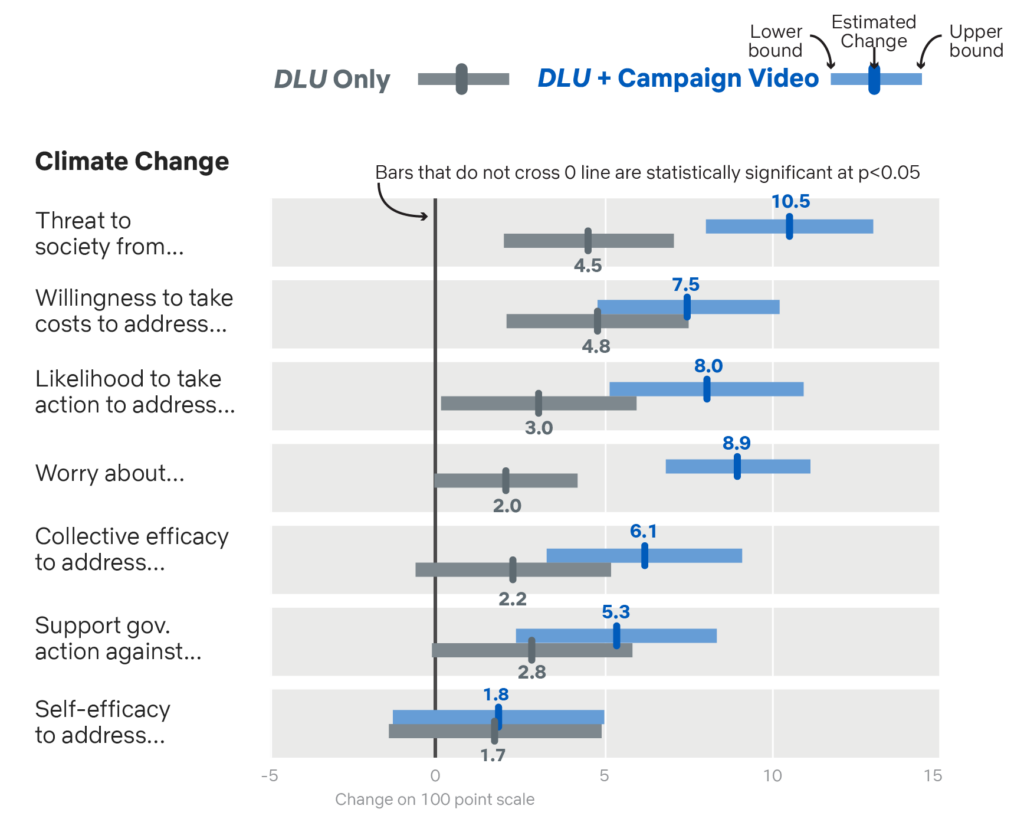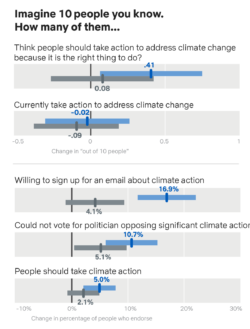Authors: Dr. Erik Thulin, Abdurakhim Rakhimov, Dr. Anirudh Tiwathia
Whether it’s film, television, or social media and digital content, entertainment may have the potential to inspire broad and diverse audiences to take action on climate change. The film Don’t Look Up (2021) and its surrounding marketing and PR campaign present a unique opportunity to test this proposition.
Don’t Look Up is a star-studded allegory for humanity’s collective failure to respond to climate change. One of the few high-profile narrative films to address these issues, Don’t Look Up set streaming records upon its release and was nominated for four Academy Awards, including Best Picture.
Rare designed and analyzed a rigorous randomized controlled trial (RCT) to assess the film’s impact on climate-related beliefs and attitudes, both on its own and when paired with a video from the marketing campaign intended to amplify the climate message. The study focused on their respective impacts on the key psychosocial factors that behavioral science research suggests are critical for motivating climate action.
Study Overview
Methodology
Participants from 10 countries* were randomly assigned to one of three conditions to estimate the impact of the film and related marketing video:
- Watching Don’t Look Up (n = 459)
- Watching Don’t Look Up and a brief marketing video of the film’s lead actor Leonardo DiCaprio speaking about the film in relation to climate change (n=463)
- Watching 1 of 5 non-climate-focused control films (n = 480)
Participants completed surveys, both before and after viewing their assigned content, measuring key mental states that behavioral scientists believe are vital for shifting to inspire climate action. By comparing the changes in these states across the three conditions, we were able to estimate the impacts of the film and marketing video across the ten countries studied.
See the full report for a detailed description of the methodology.
[* = UK, Brazil, Mexico, USA, Canada, France, Germany, Spain, Italy, and Australia]
The variables measured here were designed to capture core beliefs and attitudes that previous research has shown to be critical precursors to behavior adoption. These serve as the study’s primary measures.
- Viewing Don’t Look Up alone significantly shifted some mental states but not others, resulting in a mixed pattern of results. However, viewing the film plus the marketing video produced more consistently statistically-significant impacts.
Impacts of watching the film and the marketing video include:
- Increase in perceived threat of climate change to society (10.5pt increase on 100pt scale)
- Increase in worry about climate change (8.9pt increase on 100pt scale)
- 10.7% decrease in people willing to vote for someone who opposes significant climate action
- Increase in self-reported likelihood to take action to address climate change (8pt increase on a 100pt scale)
- Increased support for government action to address climate change (5.3 pt increase on a 100pt scale)
Note: The measures highlighted above have also shown movement in another study of climate-forward narrative content conducted by Rare. As with the other study, we did not find any impact of either the film or the secondary marketing material on measures of social norms (belief about others taking action; belief that others expect one to take action), self-efficacy (confidence in one’s ability to take action), or faith in government and other institutions to address climate change successfully.


Why these findings matter
Not all climate-related film or TV will explicitly surface the issue of climate change, or even say the words “climate change.” These results underscore the remarkable impact of pairing such stories with relevant – and more climate-focused – marketing content. This approach may be particularly critical for allegorical films like Don’t Look Up.
While the film alone had some impact, adding the climate-focused marketing video substantially enhanced that impact. This insight is a helpful reminder that multiple facets of a film release – not just the film itself – can work together to inspire change. Effective marketing and PR can elucidate climate themes and make calls to action more tangible.
Secondary Findings: Insights on Film-Specific Measures of Climate Beliefs
The variables measured here were designed to capture key climate-relevant themes highlighted in the film. Unlike our primary measures, which are broadly important for driving climate action, these measures are more film-specific and may have more complex relationships with motivating individuals to take action.
For both the people who watched Don’t Look Up alone as well as those who watched Don’t Look Up plus the marketing video with DiCaprio, we also saw a broad impact on a variety of film-tailored measures of climate beliefs, including:
- An increase in the sense that social problems and bad actors are impeding climate action, and
- An increase in the perception that climate change is a threat across various social, economic, and political dimensions.
For those who watched Don’t Look Up plus the marketing video, we saw a decrease in the perception that other people and institutions are currently taking action.
Additionally, for both groups, we did not see any reliable impact (increase or decrease) on people’s beliefs that public pressure can influence organizations and institutions to take more action. Nor did we see an improvement in the belief that governments and institutions can successfully address climate change.
Please see pg 16-17 of the report for more fine-grained results.
Why the findings matter
Don’t Look Up – whether accompanied by the marketing video or not – shifted audience perceptions about the forces impeding climate action and highlighted the diverse threats posed by climate change, which are central themes in the film.
We also see evidence that stark representations of climate inaction can decrease audience perceptions about the magnitude of current efforts. This is important to understand, as some creatives may want to express frustrations or fears about climate change in their stories but may also want to instill in audiences a sense of hope or efficacy.
Research suggests that a sequence of messages that transitions from fear to hope is more effective at generating productive action than messaging that is fear or threat-based alone. Pairing Don’t Look Up with marketing material that celebrates current progress or highlights wins of the climate movement, while also identifying the challenges ahead, may have been effective at boosting perceptions of collective efficacy (i.e., the belief that people – acting together – can influence institutions and successfully tackle climate change). This can help inspire audiences to engage in civic action.
Advances in Methods in Entertainment Impact Research: Using RCT data to understand the impact on those who naturally chose to watch
This study employs a Randomized Controlled Trial (RCT) design to rigorously answer the question, “How does this film impact a representative sample of the population?” RCTs often provide more accurate insights than methods comparing those who chose to watch a film to those who chose not to, as these groups can differ in numerous hard-to-measure ways.
If the goal is to understand how the film impacted those who chose to watch it naturally, traditional RCTs may not directly answer this question. However, recent advancements in epidemiology and statistics have resulted in new techniques for transporting RCT results to better represent populations of interest, such as those who previously viewed the film.
For the first time in entertainment impact evaluation, we apply these techniques to estimate the impact of viewing the film and hypothetically viewing the marketing video in the population of those who naturally chose to watch.
Our full report provides a detailed description of the methods and measures, transportation results, impact on film-specific climate mental states, and demographic and psychographic profile of the film’s audience.
For more information about the research, contact Dr. Erik Thulin, at ethulin@rare.org.